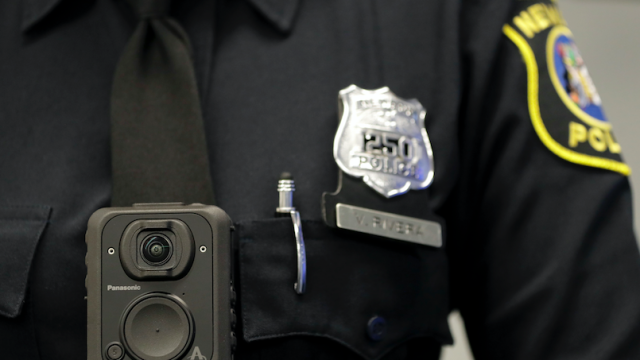Pennsylvania state senators are pushing for a new bill that would amend the state’s body camera policy to allow officers to record in private residences and exempt all footage from the state’s “Right to Know” act — making it much harder for the public to request recorded video. If it passes, it would be among America’s most restrictive and invasive body camera policies.
Image: AP
Senate Bill 560, introduced by Senator Stewart Greenleaf in December, amends the state’s Wiretap Act — which bars law enforcement from recording conversations in residences — to allow police to use the cameras to record footage inside private homes. The bill passed the senate unanimously on May 10. (There’s no precise timetable for approval going forward, but it would need to happen before the session ends this November.)
In a memo announcing his sponsorship, Greenleaf said the measure is necessary “because so much [officer] work involves responding to incidents taking place inside a residence”. The language of the new bill permits officers to record in people’s homes without notifying citizens they’re being recorded, even if none of the residents are suspects in a crime. Residents, suspected of a crime or not, aren’t granted authority to compel officers to stop recording them.
Andrew Hoover, the communication director for the ACLU of Pennsylvania, says the bill relies entirely too much on officer discretion about when to record.
“This is really broad language,” Hoover told Gizmodo. “There may be narrow circumstances in which an officer can and should be recording, such as a search warrant or arrest warrant… but this bill, the way it’s written, basically allows recording in a residence carte blanche.” (The Wiretap Act requires two-party consent for recording conversations, and this bill exempts footage from that requirement.)
There’s no single, federal body camera policy in the US, and departments are free to create whichever policy they feel suit the needs of their own community. However, that means regulation is scattershot across departments, and many privacy concerns, protection for minors and assault victims and rules on retaining footage, go unaddressed until after an issue arises.
Greenleaf acknowledged the privacy concerns, saying in the memo, “measures can be taken to protect the privacy of the occupants of the residence,” presumably referring to redaction software that can blur out people’s faces and distort or remove audio so they can’t identified. Redaction software protects the identity of those recorded, but can be a lengthy process — agencies usually only redact footage before it’s released to the public.
That leads to our second concern: SB560 would exempt body camera footage from the Right to Know law. With most public records, the Right to Know law designates an officer to coordinate with the public for most records requests. But, instead of filing a traditional records request, body camera footage would have its own request process.
Per Pennsylvania’s Courier Times, here’s how SB560 would require people to request footage (emphasis ours):
Greenleaf’s bill, however, puts a time limit of 20 days to file a request for a body camera recording and also requires the person to identify his or her connection to the footage they are requesting. If a request is denied, according to Greenleaf’s bill, the requester has 30 days to file an appeal with the court of common pleas in the county where the police activity happened and also pay a $125 [$AU167] filing fee.
By exempting body camera footage from the Right to Know act, officers gain the ability to outright deny requests if the agency determines they’re part of an investigation. Of course, that creates leeway to deny requests for that very reason, to stall, or to force the filing fee.
Hoover took issue with the time limit. “If there’s a dispute between an officer or a person or there’s a use of force incident, 20 days is completely arbitrary,” he said, pointing out that agencies retain the footage for much longer than 20 days — so why pick that as a cutoff date? Another problem is charging people to access footage, which would likely disproportionately impact the poor.
“The filing fee to appeal a denial could price people out of being able to get the video,” Hoover said, noting that many use of force incidents occur in poor communities. “They may have a legitimate argument to make… but if they can’t come up with the $125, they’re out of luck.”
Hoover points out that police departments could add their own amendments to the bill — reigning some of this in should they choose to — but SB560 would put that entirely at their discretion. Now that the bill has passed the Senate, it’s on its way to the House Judiciary Committee — where Hoover said it may find a sympathetic audience.
“Our sense right now is that this has a strong chance of passage,” he said.
